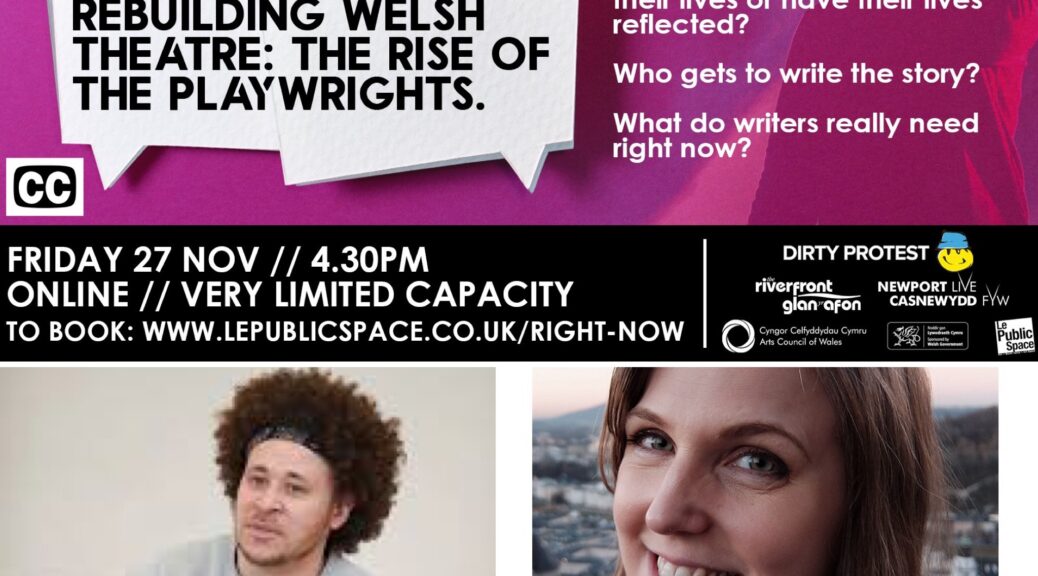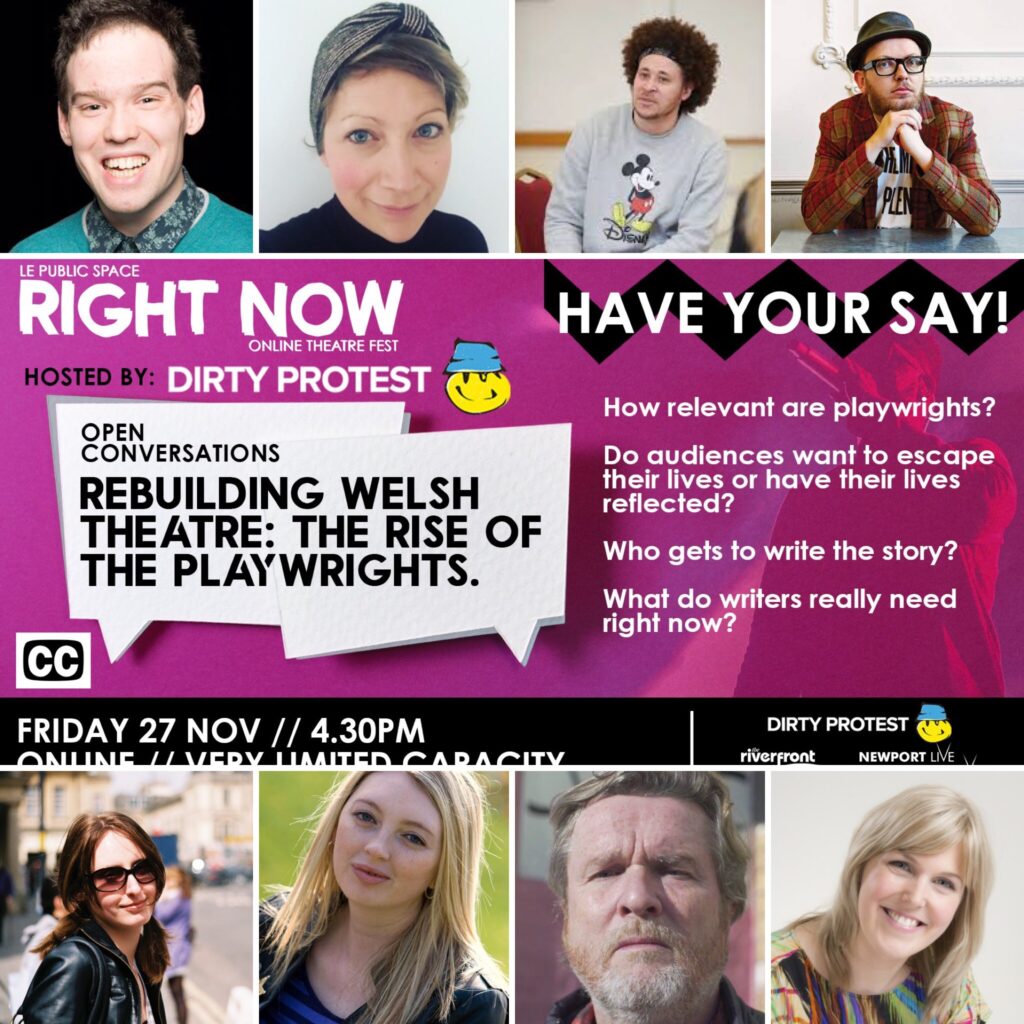
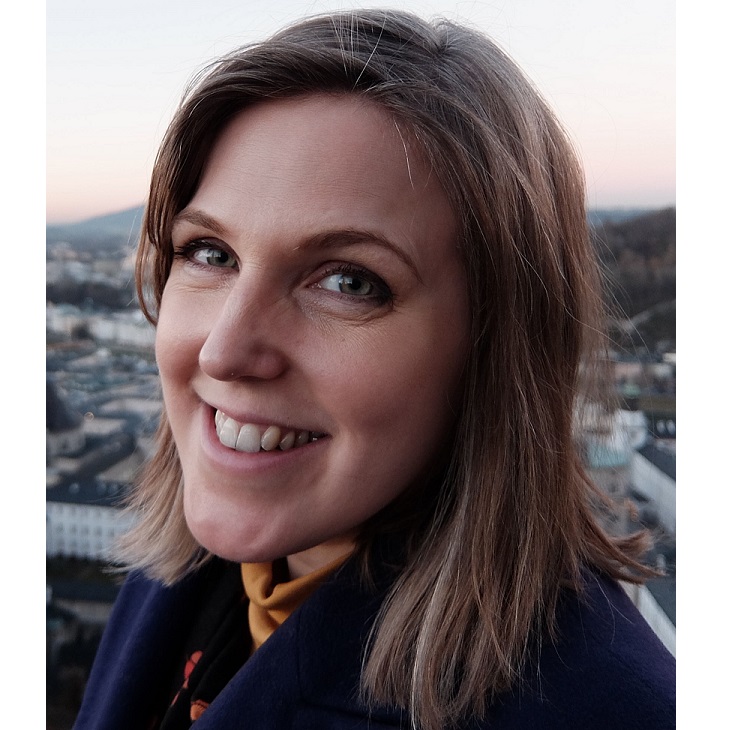
In this interview Catherine Paskell, Artistic Director of new writing company Dirty Protest speaks to Guy O’Donnell about the background of Dirty Protest, Right Now a new online theatre festival and her future plans.
Hi Catherine thanks for taking the time to chat with me. We last spoke as you were about to take Sugar Baby by Alan Harris to the Edinburgh Fringe Festival in 2017.
We are meeting today to discuss a festival closer to home which takes place in Newport this November.
Right Now, Online Theatre Festival. A short online festival of work in progress from some of Wales’ most exciting solo-performance-makers. The event takes place online from the 23 Nov- 28 Nov, 23:00 On the Le Public Space Website.
The event is described as,
“Right Now is an expression of urgency. Because theatre isn’t temporarily paused waiting to happen some where in the near future. It’s alive but physically unable to be experienced. It’s here now.”
This sounds like a vital arts event, how did Dirty Protest come to be involved?
It’s vital that theatre continues to be seen and enjoyed, because theatre and performance has continued throughout the global pandemic. Dirty Protest, like Le Public Space and many inspirational companies didn’t stop making work, engaging artists and talking with audiences and our wider communities as the Coronavirus hit. We found new and different ways to keep going and keep each other going. This is a celebration of that, and an invitation for others to join us in rebuilding and reimagining theatre in Wales.
One of the specific events you are supporting is an open conversation titled ‘Rebuilding Welsh Theatre: The Rise of the Playwrights!’ This takes place on Fri 27th Nov at 4.30pm.
Dirty Protest has a rich history in supporting Welsh Playwrights from script in hand readings in a yurt at Milgis, Cardiff, performances at The Royal Court in London to National tours of award-winning plays. Has the support networks for Welsh Playwrights and the resulting work being produced improved over the lifetime of DP and if so how?
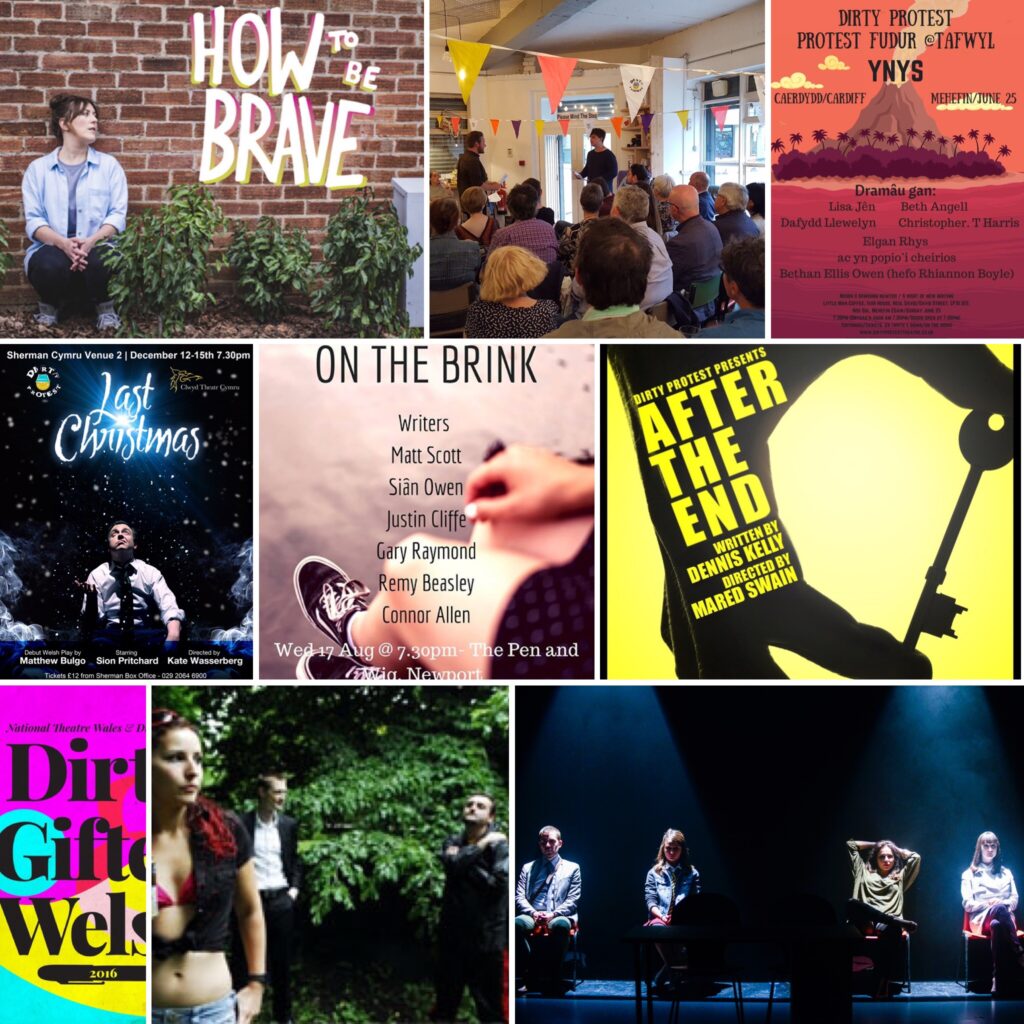
When Dirty Protest first started in 2007, there was no one offering the network and opportunities that we built. It’s why we started in the first place. Over the lifetime of DP so far, many newer companies than us have cited Dirty Protest as their inspiration, including the founders of National Theatre Wales, The Other Room in Cardiff and other numerous Fringe theatre companies who have produced work by Playwrights. In that time, we have seen improvements, as well as the sector still struggling to offer the support that Playwrights really need to sustain their own careers and produce work worthy of our audiences.
In the past 13 years, the networks and opportunities for emerging Welsh Playwrights have become more numerous. The Fringe scene has grown exponentially. Having a big Fringe scene and more Fringe producing companies give more frequent opportunities for early career artists. In recent years, we have seen more Welsh Playwrights produce work that is noticed on stages, television screens and streaming services across Wales and outside our borders. More theatres and companies are offering early career development, and there have been opportunities for writers to get work out there across numerous digital platforms in the global pandemic.
In this time, we have also seen the erosion of openly available spaces for Fringe companies and playwrights to try out their ideas. Spaces that were accessible and free to use in our formative years – pubs and cafes and little shops – now either don’t exist, or those that do now charge hire fees for artists to use the space, or require a share of ticket sales, or guaranteed spend on the bar. The Fringe is bigger, but there are fewer open access spaces and less opportunities to get work made unless you are already connected to the “right” people, or have the money to hire a small space for performance. This squeezes out certain artists and also means we tend to hear similar voices and stories, at a time when we need to hear more under-represented voices and stories.
We also need to see more opportunities open up for our mid-career writers and those Playwrights who are stuck in the space after their first play, when they need a second, third and fourth investment (and maybe more) to kick off their career. We need much more investment for artists beyond the early years, when companies and producers want to find “their” playwright or claim to have “discovered” a new voice. The truth is that Wales is a nation of playwrights who need sustained, long term investment and they are being underserved by the current system.
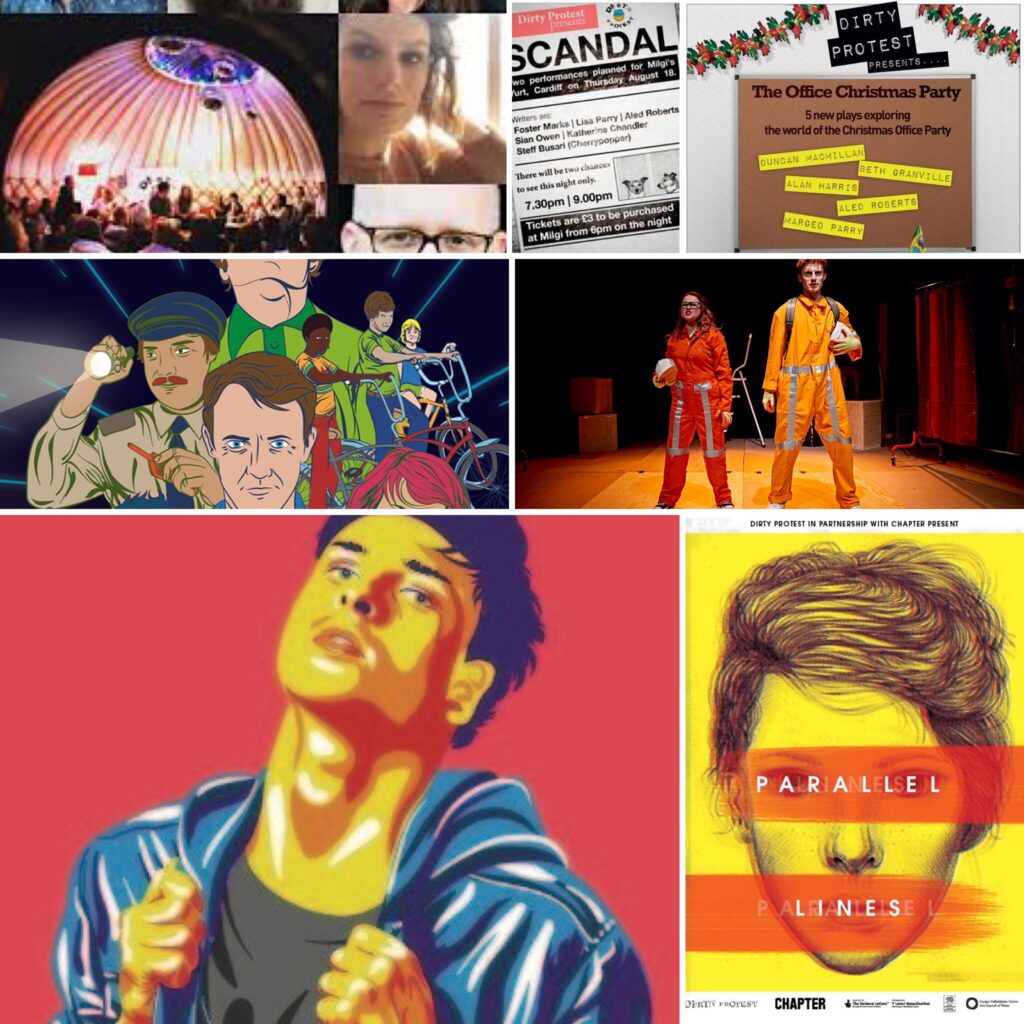
I believe you will be discussing the questions below for your Open Conversation, why did you decide on them and what do you hope to achieve? The questions are;
How relevant are playwrights?
Do audiences want to escape their lives or have their lives reflected?
Who gets to write the story?
What do writers really need right now?
We decided on these questions because these have come up repeatedly through the global pandemic in meetings with artists and audiences. We want to provide a platform to reimagine what we want theatre in Wales to be, and how we exist in the world during and after a global pandemic.
This conversation at 4:30pm on Friday 27 November needs to be useful for Playwrights and those who work with them, a practical resource as well as space for Playwrights to share, be listened to, and to take action towards changing the sector, to make it more democratic and more accountable. These questions frame real concerns for the sector and our artists and audiences, so it’s a place to start.
Please do come along and join the conversation, to be heard, to listen and to move forward.
Alongside Catherine we asked a range of Welsh/Wales based Playwrights to give their own response to the questions proposed by Dirty Protest.

Connor Allen
How relevant are playwrights?
Playwrights are integral to storytelling. Their relevance is second to none because stories are so important. Ever since the dawn of time stories have been a way of communicating and understanding our places and purpose. Thats where playwrights come in as they write the stories that entertain us, reflect our experiences back at ourselves. Without playwrights we wouldn’t have the broad range of stories to connect with.
Do audiences want to escape their lives or have their lives reflected?
I think both. I always say that theatre is a reflection of life and all lives are different so audiences get to see different reflections of different experiences all the time. BUT also audiences want to be entertained and an escapism of the real world can be achieved through theatre and TV. They can escape for an hour and just get absorbed in the joy and magic of the story being told.
Who gets to write the story?
I believe that anyone can tell and write stories. It depends on the context. Wether that comes from a genuine place is a different story. We all have stories to tell as we are all unique miracles with different perceptions of the world and different experiences that have made us the people that we are. Contained within that are beautiful stories that deserve to be told. I think in todays society we are more aware of the authenticity behind peoples stories and experiences. Where representation and opportunity is rife we can’t have the same people telling the same stories. BUT does that mean that only certain people can tell certain stories specific to them. Its a difficult question. I think there’s a difference between a white playwright writing a play with a black character in it as opposed to a white playwright writing a play about what it means to be black for example and I think a lot of people confuse those two points.
What do writers really need right now?
Time and financial support. Those are the 2 key factors I think that writers need as of now. Time to work on that next idea without the worry of how the rent is going to get paid. Also constructive feedback on drafts where playwrights can have their work in progress read to audiences to help the development. i find it so helpful to hear my words read out loud. Having that option readily available for playwrights is another thing but in a constructive way. There is no point saying “that was shit” because that’s not helpful to a playwright. Thats not helpful to anyone. Give them constructive points on how to make it better and the current playwrights will develop work that is truly exceptional (not that it isn’t already)
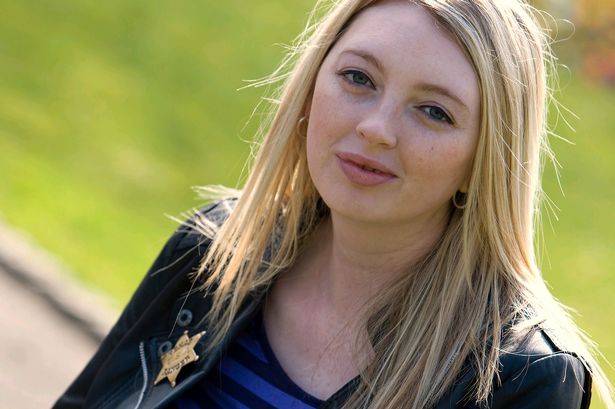
Rachel Trezise
How relevant are playwrights?
More than ever before we need playwrights to tackle the issues of class and identity. The UK and beyond is dangerously politically divided. Times are strange and volatile. Out of all the art forms, theatre has the most ability to put audiences into characters shoes and consider other people’s point of view.·
Do audiences want to escape their lives or have their lives reflected?
Both! And a well-told story can do both. For some of the audience it will be escape and for others a reflection of their own experiences. We just need to make sure we have enough stories to speak for everyone.
Who gets to write the story?
Someone who knows it in their heart, their head, their bones.
What do writers really need right now?
To know how relevant they are.
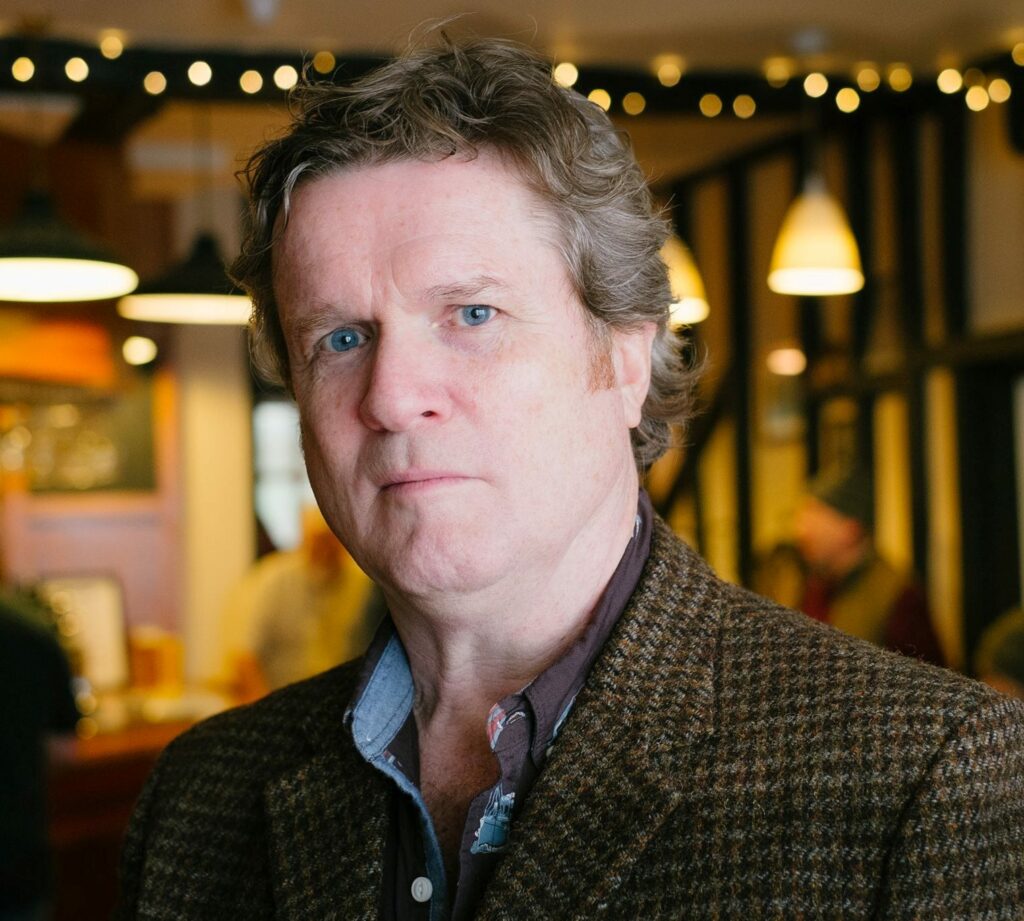
Jon Treganna
How relevant are playwrights?
Theatre is one of the oldest forms of storytelling. Clearly now people get drama from TV, social, books and online content, but a great piece of theatre can move people like nothing else. It’s a shared experience.
Do audiences want to escape their lives or have their lives reflected?
I’m not one for kitchen sink dramas and my heart sinks when I see a sofa and 2 chairs on stage. I think that people go to the theatre for a sense of adventure and to escape their lives, especially after Covid and austerity. Even if a play reflects their lives, it should be heightened and they should be moved or thrilled.
Who gets to write the story?
I like interactive dramas where the audience is part of the show. However, I might be old school but I think the playwright writes the story.
What do writers really need right now?
We need shows back on stages, even with social distancing. We need to create theatre shows that dazzle and entertain after such a dark period. And yes, we need more commissions.

Lisa Parry
How relevant are playwrights?
Playwrights themselves or the work? Plays themselves ebb and flow depending on the times; I think that’s the magic of them. CP Taylor’s Good feels really relevant at the moment but it was commissioned in the early 80s. But if you’re asking whether playwrights in Wales are relevant to the scene here, then I would say 100% yes – you only need to look at the audience numbers for shows like Iphigenia in Splott or Sugar Baby. But I don’t think we’ve been given a chance to prove how relevant we are yet. I think that was only just starting to happen before lockdown with the announcement of a new literary department at the Sherman. During lockdown and the rest of this year, it’s been playwrights making the work that we’ve been able to experience, partly because it’s easy enough to do that over Zoom. And I think the commitment of companies like the Sherman and Clwyd to addressing BLM will help in terms of ensuring that the voices coming through are representational and therefore the work relevant to a whole range of different communities that make up modern Wales.
Do audiences want to escape their lives or have their lives reflected?
Both. It’s hard to enjoy a story – even if you’re after pure escapism – if you can’t relate to it in some way. There’s always a chink or an in. And you never know what that’s going to be for the individual audience member. But getting that balance right after Covid is going to be an interesting challenge and one I think we need to be mindful of.
Who gets to write the story?
I’m not sure it’s a case of who gets to write it so much as who gets to have it put on stage and there’s no escaping the fact that white male work has dominated our stages for generations, for various reasons. I think that’s changing and I think playwriting groups have helped it change but there’s still heaps more to do.
What do writers really need right now?
Support – whether that’s social support (writing’s lonely but Covid has made that a thousand times harder) and also financial support. You need time to write. Time’s tricky when you also need money to buy food and to pay the rent. The Writers’ Guild has been campaigning for theatres to keep commissioning writers so that they don’t get lost to the industry, which I think’s really important. I also think at the moment it’s really important that we keep talking to each other. It’s peculiar writing at the moment – I’ve deadlines for stages that are currently occupied by ghost lights. It’s a weird feeling. It’s also possibly the most optimistic and hopeful thing I can do and I think we need to somehow keep that belief going that we’ll be back as an industry and that the relevance of playwrights here will take a firmer hold.

Tom Wentworth
How relevant are playwrights?
We must try to reflect the times we’re living in as well as providing, as in my own work, some sense of escapism. These two potential outputs mean that playwrights are more relevant than they have ever been for reflecting and taking the temperature of the nation.
Do audiences want to escape their lives or have their lives reflected?
I firmly believe audiences want both. Every play should be a combination of dark and light. You can say a lot about the fractured, difficult and tremulous state of the world in a comedy.
Who gets to write the story?
Whoever is from the community the play is about. I want authentic stories and top class writing. I want to see things I’ve never seen before. Say no to tokenism and cultural appropriation. If you’re from a community with a story to tell – write it .
What do writers really need right now?
Time and money, as ever. We may not have spaces for our work to be performed in but we need commissions so they will be full to the brim when performances are allowed again. Don’t skimp on the money. Pay writers properly and give them the time and dramaturgical support they need. This is not a luxury, it’s the way to ensure financial success at the box office.

Tim Price
How relevant are playwrights?
I think Playwrights have never been more important. Dramatic storytelling is the number one form humanity chooses to consume stories. Of course there are plenty of other forms, and multidisciplinary styles and documentaries, and poetry and all the other rich outputs we achieve but fundamentally – a dramatic story is everyone’s preferred medium to understand the world. Cinema and television come from plays and playwrights. There’s a reason England and the UK generate so much Intellectual Property that sells globally, it’s because of the culture and tradition of dramatic storytelling. To build a theatre culture without dramatic storytelling at its heart is to condemn us to perpetual marginalisation. There’s vehicle to take Wales to the world, and it’s dramatic stories. We shouldn’t be anxious about it.
Do audiences want to escape their lives or have their lives reflected?
Probably both depending on where they’re at. When I was younger I wanted to see myself on stage because I didn’t see myself anywhere else. Now I’m older with responsibilities I think I want escapism.
Who gets to write the story?
Even when I’ve written stories and had them produced I still doubt I was the right person to write it so this is a difficult question to answer. My thoughts shift week to week. I’ve been of the mind that as long writers research and write with respect they should have the freedom to write any story about any community otherwise those marginalised voices will forever be required to write stories about marginalised voices and communities. The problem is right now those with the power to get produced are predominantly from one group, so it looks extractive and exploitative when they write from places beyond their experience. I think maybe my instinct for writers to be free to write whatever they want is an aspiration the industry hasn’t earned yet.
What do writers really need right now?
Opportunities.
Catherine Paskell
Please do come along and join the conversation, to be heard, to listen and to move forward.
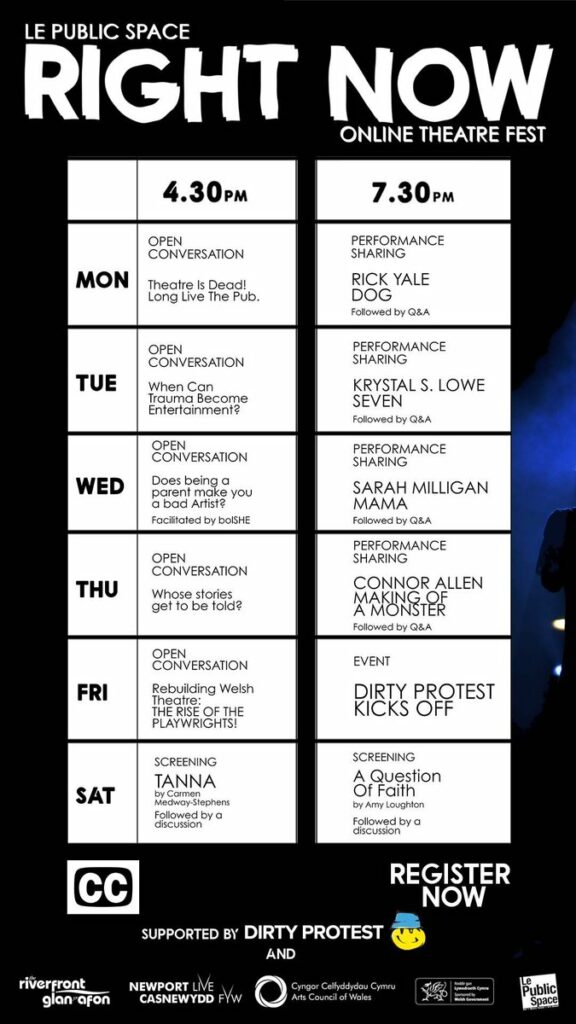
We also have an event at 7:30pm on Friday evening called DIRTY PROTEST KICKS OFF. This showcases work in development by ten writer-performers, who responded to our open call out to KICK OFF. These artists are sharing very short excerpts of work in development, to KICK OFF Friday night. Some are performing their work in Le Pub, others will be joining us on Zoom. Some are dramatic monologues, some are interactive, some mix languages of movement and text into a new play. All are the future of theatre. Come and join our Dirty Social! This is a great way to find out more about Dirty Protest, the kind of work we do, and get involved in our upcoming opportunities.
Both the Open Conversation at 16:30 and Dirty Protest KICKS OFF at 19:30 on Friday 27 November are closed captioned.
And finally, what’s next for you and Dirty Protest?
We have some really exciting announcements coming up!
As you already know, over the past 13 years, Dirty Protest has been able to support writers from the very start of early ideas, through short play development, full production and international touring. We are doing more of this, in new and bigger ways, in physical spaces AND digital spaces, with more writers, artists and arts workers. Our audio collaboration in Brazil with six young writers in the Complexo da Maré favela community in Rio will be released in December, and we have new collaborations to announce with more partners. We have been working since March to build opportunities for artists and meet with our communities and audiences – and we can announce the specifics of new Wales-based and international projects, new opportunities, a new writing artists network, and new shows in English and Welsh coming up next very soon! Watch out!
Thanks for your time Catherine
Get the Chance values the role playwrights living and working in Wales bring to the cultural life of our nation. You can read more interviews with the Playwrights above and a range of other Welsh/Wales based Playwrights here
Get the Chance is a voluntary ran organisation, to donate to our work please click here

